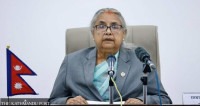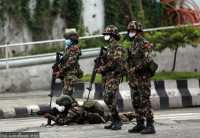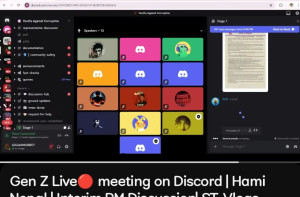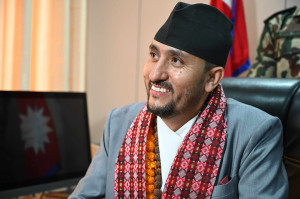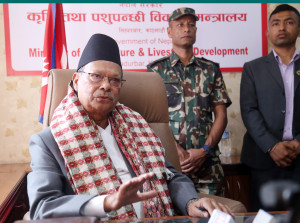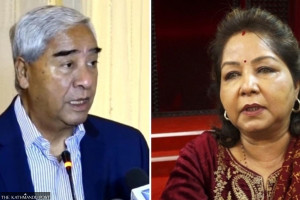Politics
Bill to amend Political Parties Act mulled to ‘browbeat fringe forces into backing ordinances’
Smaller parties accuse Congress and UML of planning law revision to effect splits in them.
Purushottam Poudel
The KP Sharma Oli-led coalition government faces a major hurdle in passing six ordinances due to its lack of a majority in the National Assembly. As a way out, it is contemplating introducing a bill to amend the Political Parties Act-2017 to make it easy for a party split thus exerting pressure on smaller parties that are unsupportive of the ordinances.
Speaking anonymously, a senior leader from the Nepali Congress said that the government feels compelled to act as fringe parties were using their few seats to obstruct necessary legislation despite the ruling allies the Congress and the CPN-UML commanding a thumping majority in the House of Representatives.
“These parties, though they represent a small fraction of the electorate, are leveraging their presence in the legislature to give undue pressure on the government. This has compelled the government to consider introducing a bill related to political parties,” the leader stated.
To prevent political parties from splitting repeatedly due to internal discord, the Political Parties Act-2017 had a provision requiring the party’s 40 percent of existing central committee members and lawmakers separately to split a political party.
However, the very provision in the law that was intended to achieve this objective has caused trouble for the government. To bypass the rule, the Sher Bahadur Deuba-led government in 2021 introduced an ordinance to enable 20 percent of a party’s central members or its lawmakers to register a new party.
The Congress leader acknowledged that while fringe parties have the right to contend with the government, their actions have significantly hindered the law-making process. The details of the proposed bill are still being finalised, with more information expected to come out in the coming weeks.
The Political Parties Act, which was nullified by the ordinance four years ago, has yet to be replaced. This has left a gap in the legal framework for registering new political parties. The 2017 Act included provisions allowing dissidents to split from a party and form a new one if they could prove the support of 20 percent central committee members or lawmakers.
In August 2021, the Deuba-led coalition government amended these provisions through an ordinance, reducing the threshold for forming a new party from 40 percent to 20 percent of central committee members and lawmakers.
This change facilitated the formation of new parties by Madhav Kumar Nepal of the CPN-UML and Mahantha Thakur of the Janata Samajbadi Party Nepal (JSP-Nepal), both of whom had opposed then-prime minister KP Sharma Oli.
With the new ordinance facing an uncertain future due to the ruling parties being in a minority in the upper chamber, the government is considering introducing a bill in both houses to amend the law related to political parties.
According to Article 114 (2) of the constitution, ordinances must be endorsed from both houses of the federal parliament within 60 days after the commencement of the new House session subsequent to the promulgation of an ordinance. If not passed, they automatically lapse.
The Oli government had planned to table the six ordinances on January 31, the first day of the winter session. However, uncertainties over its majority in the Assembly deterred it. The government now aims to present the ordinances on March 5.
Despite a clear majority in the lower house, the coalition is three seats short in the National Assembly. Two Madhes-based parties’ opposition has further complicated the situation.
The Upendra Yadav-led JSP-Nepal, which has three seats in the upper house, gave its vote of confidence to Prime Minister KP Sharma Oli but it hasn’t joined the Cabinet. The Loktantrik Samajbadi Party (LSP), led by Mahantha Thakur, opposed the Land Act amendments despite the party being in the Oli Cabinet. This opposition has prompted the government to consider amending the Political Parties Act.
Gyanendra Bahadur Karki, a Congress leader and lawmaker, stressed that the government has the constitutional right to introduce bills as it needs, subject to approval by people's representatives. He denied that the proposed amendments to the bill related to the Political Parties Act target any specific party.
Rajendra Pandey, vice-chairman of the Unified Socialist, also claims that the upcoming bill related to political parties is not targeted against his party. He said that the bill could instead put pressure on the JSP-Nepal.
“It’s an attempt by the government to put pressure on the JSP-Nepal by conveying that the Unified Socialist will also support the government in passing the ordinance,” Pandey claimed.
“However, that attempt will not be successful. The bill cannot be passed by simply tabling it in Parliament, there is a whole process before it is passed.”
But Unified Socialist Secretary and lawmaker Metmani Chaudhary claims that the bill is aimed at splitting his party.
Since the JSP-Nepal vocally opposes one of the ordinances, the bill related to the political parties will fail, said Chaudhary.
Oli’s party, UML, during its secretariat meeting on Sunday, decided to make utmost effort to build consensus among the ruling parties to put the ordinances to the parliamentary process.
After the meeting, UML General Secretary Shankar Pokharel told media persons: “We discussed [at the meeting] ways to move forward in a comfortable environment. At the very least, we will try to find consensus among the ruling parties to pass the ordinances from both houses.”
Meanwhile, JSP-Nepal chair Yadav has accused the government of undermining smaller parties. At his party’s central committee meeting in Lalitpur on Sunday, Yadav criticised the Oli government for manipulating and weakening fringe parties.
He also reiterated his party's opposition to the Land Act amendments, stating, "The land ordinance, which seeks to amend certain provisions of the Nepal Acts related to land, is not in the public interest. Our party will firmly oppose it."




 17.62°C Kathmandu
17.62°C Kathmandu
